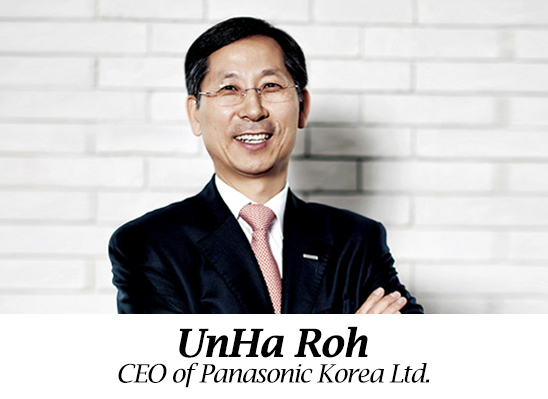Feature Stories
- Home
- Why KOREA
- Feature Stories

Ushering in a New Era of Shared Prosperity
Since its founding, Panasonic Korea knows that contributing to society is at the heart of its success
Corporate social responsibility (CSR) has long been at the core of company culture, but at Panasonic Korea, CSR is more than just building up a brand’s image--it’s about building a better quality of life.
UnHa Roh, CEO of Panasonic Korea Ltd., understands more than anyone how important it is to give back to the community. “A company can give back to society by creating high-quality, value-added products to consumers or provide new technologies to improve their daily lives,” says Roh. “But it’s also important to take it a step further and solve challenges facing our society today, which is we actively carry out CSR activities.”
Together with the company’s long history of contribution and its reliable products, Panasonic has grown into one of the world’s most popular brands, cementing its status throughout the world for producing reliable products. Despite its monumental success in the electronics industry, however, Panasonic has humble beginnings.
In June 1918, founder Konosuke Matsushita set up shop in a tiny two-room tenement in Osaka, Japan. The company that was to become Panasonic was started the following year, with a staff consisting of only three people: his wife, his brother-in-law and himself. Fast-forward to 2016, and the company has over 260,000 employees working around the world. Today, Panasonic’s dedication to innovation and societal change makes it both a Japanese and international powerhouse.
Staying faithful to the company’s slogan--A Better Life, A Better World--Panasonic Korea is carrying out a number of CSR activities to help the less fortunate, including donating digital cameras to underprivileged youth staying in care facilities throughout the country. Roh, who was appointed CEO in 2010, didn’t want this end as a one-time event, going above and beyond to make a change.
“I didn’t think it was enough to just give these kids cameras because it would have little to no impact. I wanted to inspire them, make them more independent and build up their confidence so they could follow their dreams,” he adds. “That’s why we started a photo contest three years ago where underprivileged kids can submit their own photos that they took with the cameras we gave them. We even hold a photo exhibition in our building’s plaza.”
Throughout the interview, Roh brings up the phrases ‘co-existing’ and ‘co-prosperity’. Aside from working with underprivileged youth and the elderly, Panasonic has been a sponsor for the Olympics since the Calgary Winter Olympics in 1988. This history of giving continues at the 2018 Pyeongchang Winter Olympics, as the company will provide high-quality broadcasting equipment like LED displays. “The Olympics is a festival that is celebrated by all and we hope that through the sponsorship of our high-quality technology, this celebration can be enjoyed more fully,” says Roh.
Like its contribution to the Olympics, Panasonic Korea is extending its CSR activities overseas--even in remote areas of Central Asia. In February of this year, it signed an MOU with the International Information & Networking Centre for Intangible Cultural Heritage under the auspices of UNESCO (ICHCAP) and the Korea Education Broadcasting System (EBS) to film a documentary series on the intangible cultural heritages of five countries (Mongolia, Uzbekistan, Kazakhstan, Tajikistan and Kyrgyzstan). As such, the company will provide high-quality 4K handheld camcorders for the documentary as an effort to store history and spread awareness for future generations.
Green innovation is another keyword heavily embedded into the culture. The company has launched various energy-efficient products that reduce the consumption of fossil fuels, including solar power generation, electric batteries, energy storage systems, fuel cells and LED lights. It also manufactures ventilation systems for buildings, household air purifiers, water softeners, eco-friendly lamps and gas heater pumps that are being widely used by consumers. The company aims to further expand its share in the eco-friendly market in Korea as well. Most recently, Panasonic Korea released the ‘Smart Ball’, a wingless air circulator. In addition, it is carrying out an annual campaign to preserve the environment, most notably the tidal flats near the Yellow Sea, and has even purchased a hybrid company car to fully dedicate itself to going green.
When asked why Panasonic chose to open its Korea branch in 2000, Roh states, “Korean companies like Samsung and LG have already established a strong foothold with consumers here when it comes to completed household items. We didn’t think it was necessary to compete in the same field so we decided to focus on the niche market by manufacturing parts and materials that can’t be made in Korea like high-quality broadcasting equipment.”
Aside from its differentiated approach to manufacturing products, the company notes localization as the key to its success. Although Korean consumers focus heavily on price and design, they also understand the importance of quality and function--two of Panasonic’s strong suits. Well aware of the fast-pacing trends of the Korean market and the strong purchasing power of early adopters, Roh wants foreign companies interested in investing in Korea to understand that a business can’t push their philosophy and strategy without fully understanding the mind of Korean consumers first.
Despite the stagnant global economy, Roh is optimistic of the future of the Korean market. “If a product can succeed in Korea, it’s highly likely that it will become a big hit around the world,” he says. “That’s why Korea is such an important country to Panasonic.”
By Esther Oh (estheroh@kotra.or.kr)
Executive Consultant/Invest Korea










